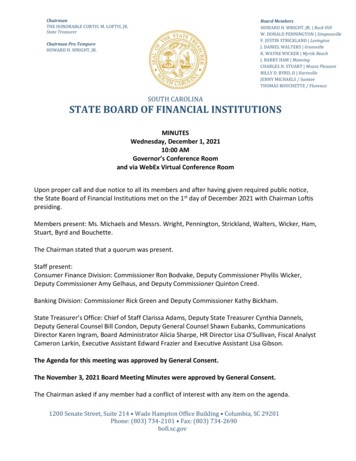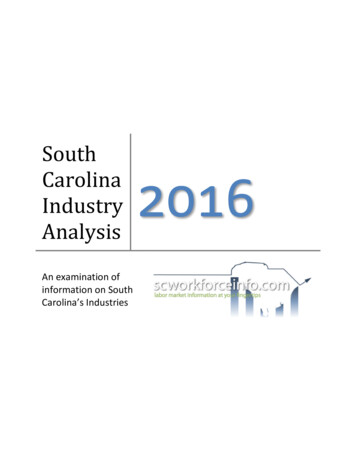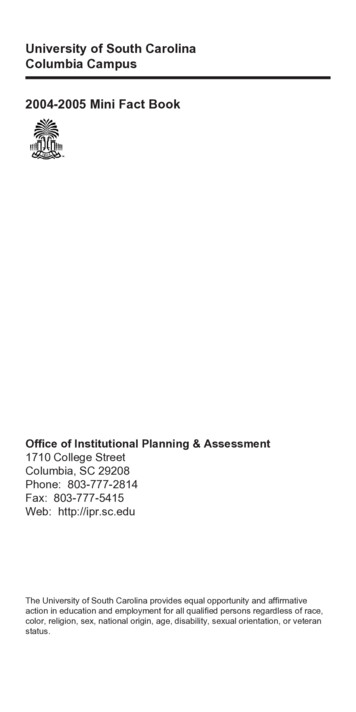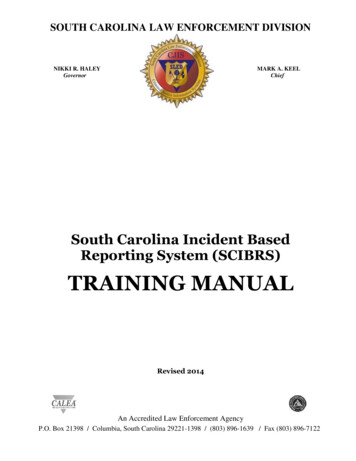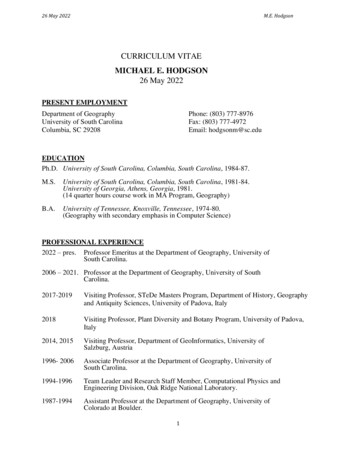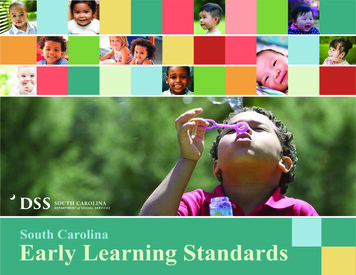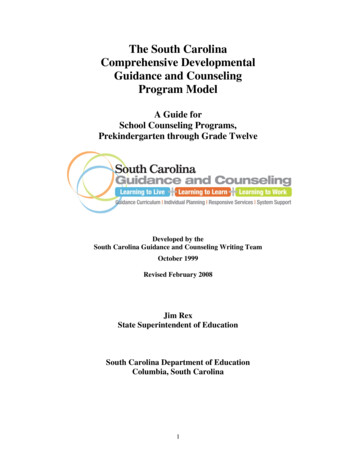
Transcription
The South CarolinaComprehensive DevelopmentalGuidance and CounselingProgram ModelA Guide forSchool Counseling Programs,Prekindergarten through Grade TwelveDeveloped by theSouth Carolina Guidance and Counseling Writing TeamOctober 1999Revised February 2008Jim RexState Superintendent of EducationSouth Carolina Department of EducationColumbia, South Carolina1
For further information on theComprehensive Developmental Guidance and Counseling Program Model,you may contact the Office of Youth Services at theSouth Carolina Department of Education.The South Carolina Department of Education does not discriminate on the basis of race, color, national origin, sex,or disability in admission to, treatment in, or employment in its programs and activities. Inquiries regarding thenondiscrimination policies should be made to the director of the Office of Human Resources, 1429 Senate Street,Columbia, SC 29201, 803-734-8505.ii
ContentsFOREWORD .VACKNOWLEDGMENTS. VISECTION I INTRODUCTION TO THE GUIDANCE AND COUNSELING PROGRAM MODEL .1RESEARCH SOURCES .1PROGRAM SCOPE AND DESIGN .2PROGRAM BENEFITS .5PROGRAM STANDARDS .6SECTION II OVERVIEW OF THE COMPREHENSIVE DEVELOPMENTAL GUIDANCE ANDCOUNSELING MODEL .10GUIDANCE CURRICULUM .10INDIVIDUAL PLANNING .10RESPONSIVE SERVICES.11SYSTEM SUPPORT .12SECTION III ROLES AND RESPONSIBILITIES OF SCHOOL COUNSELORS.16ROLE OF THE COUNSELOR IN THE SCHOOL'S GUIDANCE AND COUNSELING PROGRAM .18JOB RESPONSIBILITIES OF SCHOOL COUNSELORS .19Elementary School Counselors .21Middle School Counselors .24High School Counselors.27ROLE OF THE COUNSELOR IN PARENT EDUCATION .29ROLE OF THE COUNSELOR IN WORKING WITH STUDENTS WITH DISABILITIES .30ROLE OF THE COUNSELOR IN STUDENT DISCIPLINE .30ROLE OF THE COUNSELOR IN THE IMPLEMENTATION OF THE EDUCATION AND ECONOMICDEVELOPMENT ACT .31SECTION IV GUIDANCE CURRICULUM STANDARDS FOR STUDENT DEVELOPMENT.37STUDENT STANDARDS BY STUDENT DEVELOPMENT AREAS .37Learning To Live (Personal/Social Development).37Learning To Learn (Academic Development) .37Learning To Work (Career Development).37STUDENT STANDARDS AND COMPETENCY INDICATORS .40Grades Prekindergarten through Grade Two.40Grades Three through Five.42Grades Six through Eight .44Grades Nine through Twelve .47SECTION V SCHOOL GUIDANCE AND COUNSELING PROGRAM ACCOUNTABILITY.50RATIONALE .50GUIDELINES .50SAMPLE TEMPLATE .51SAMPLE NEEDS ASSESSMENTS .55Elementary School .55Middle School.68High School .83SECTION VI GUIDELINES FOR EVALUATING A COMPREHENSIVE DEVELOPMENTALGUIDANCE AND COUNSELING PROGRAM .93PROGRAM DEVELOPMENT CYCLE .94Organizing.95Planning .96Designing .97Implementing .100Evaluating .101iii
SAMPLE PROGRAM ASSESSMENT FORM .108SECTION VII ADEPT GUIDANCE AND COUNSELING PERSONNEL ASSESSMENT .114ADEPT FOR SCHOOL GUIDANCE COUNSELORS: EVIDENCE DOCUMENTATION .114ADEPT FOR SCHOOL GUIDANCE COUNSELORS: INTERVIEW FORM .122REFLECTION ON GUIDANCE SESSION .126CONSULTATION SURVEY.127SCHOOL GUIDANCE COUNSELOR: CONSULTATION SUMMARY REPORT .128SCHOOL GUIDANCE COUNSELOR: PROFESSIONAL PERFORMANCE DESCRIPTION .129SCHOOL GUIDANCE COUNSELOR: PROFESSIONAL SELF-REPORT .130ADEPT FOR SCHOOL GUIDANCE COUNSELORS: EVALUATION SUMMARY .130GUIDANCE AND COUNSELING PROGRAM LONG-RANGE PLAN .132APPENDIX A AMERICAN SCHOOL COUNSELOR ASSOCIATION (ASCA) NATIONAL MODELGRAPHIC .135APPENDIX B APPROPRIATE AND INAPPROPRIATE SCHOOL COUNSELING PROGRAMACTIVITIES.136APPENDIX C ASCA ETHICAL STANDARDS FOR SCHOOL COUNSELORS.138APPENDIX D ASCA NATIONAL STANDARDS FOR STUDENTS (COMPETENCIES ANDINDICATORS) .146APPENDIX E ASCA NATIONAL STANDARDS FOR STUDENTS: DEVELOPMENTALCROSSWALKING TOOLS .151ASCA SAMPLE FORM 1 .151ASCA SAMPLE FORM 2 .156iv
ForewordSchool counselors have a tremendous responsibility in addressing the personal/social, academic,and career needs of every South Carolina student in prekindergarten through grade twelve. Asstudent advocates, counselors provide support and foster student development as our childrenlearn to live, learn to learn, and learn to work.A comprehensive guidance and counseling program model establishes the guidelines necessaryto ensure a consistent framework that addresses the developmental needs of students. Rather thanoperating with “random acts of guidance,” the framework defines standards and competenciesnecessary for counselors to deliver a comprehensive guidance and counseling program to allstudents.Since 1999, school counselors in South Carolina have been guided by a well-developed programmodel, written by a statewide counselor committee and endorsed by the State Board ofEducation. Exciting changes have occurred with the passing of the 2005 Education andEconomic Development Act (EEDA) that focuses significant attention as well as increasedresponsibilities on school counselors. Section 59-59-40 of the EEDA requires school districts touse and follow the state’s comprehensive guidance and counseling program in their districts as amodel for assistance with the planning, development, implementation, and assessment of theirguidance and counseling program.I am grateful to the committed group of school counselors and counselor educators who haverevised the 1999 version of the South Carolina Comprehensive Developmental Guidance andCounseling Program Model. They have edited sections of the program model that will providethe most up-to-date information to guide districts in program implementation. Of specialsignificance is the inclusion of an accountability model featuring data-driven results that centeron the academic success of students.Required by legislation and created by school counselors, this state comprehensive guidance andcounseling program model will influence school districts as they address the personal/social,academic, and career developmental needs of our fine students. South Carolina is indeedfortunate to have a valuable comprehensive guidance model, and we are proud to share it withyou.Jim RexState Superintendent of Educationv
AcknowledgmentsGuidance and Counseling Program Model Writing TeamThe South Carolina Department of Education wishes to express its sincere gratitude to theindividuals and organizations who have contributed to the creation of the state’s ComprehensiveDevelopmental Guidance and Counseling Program Model. The agency is grateful not only to themembers of the 1999 writing team and the 2008 revisions team but also to the many schoolcounselors and counselor educators worldwide who have laid the groundwork for the state’sadoption of universally accepted counselor-related concepts, terms, and frameworks as the basisfor our program model.The following school counselors, counselor educators, and district guidance coordinators arerecognized here for their work in having developed and written the Program Model in 1999:Candice Bates, facilitatorCharleston County School DistrictDr. Ron MilesRichland School District OneGail AbernethyMt. Gallant Elementary SchoolRock Hill School District ThreeDr. Charlotte Murrow-TaylorClemson UniversityJanet PlaxicoFloyd D. Johnson Technical CenterYork School District OneArlonial Bradford-JacksonNewberry Learning CenterNewberry County School DistrictKaye RawlCentral Midlands Tech Prep ConsortiumGeraldine BrantleyAiken Technical CollegeGail RedfordOffice of Exceptional ChildrenState Department of EducationBillie BeachumCondor Elementary SchoolRichland School District TwoBarbara RobertsonMarlboro County High SchoolMarlboro County School DistrictDena CreelLexington High SchoolLexington School District OneDr. Joe RotterUniversity of South Carolina, ColumbiaKaren CulbertsonRavenel Elementary SchoolOconee County School DistrictSylvia ScottLee County School DistrictTim HulsebusAiken Middle SchoolAiken County School DistrictWillie M. ShawDarlington High SchoolDarlington County School DistrictJoy HumeAlice Birney Middle SchoolCharleston County School DistrictHelen ShortLaurens County School DistrictBrenda StorySpartanburg School District SevenDr. Betty JankoskiHilton Head Elementary SchoolBeaufort County School DistrictMaxine TylerCrayton Middle SchoolRichland School District OneBetty KendrickDorman High SchoolSpartanburg School District SixAnn WhiteLexington High SchoolLexington School District OneTeresea Mathis, parentRichland County Schoolsvi
In addition, this program model for school guidance and counseling programs for South Carolinawould not have been possible without the assistance of the following individuals in 1999:Dr. Russ BedenbaughDirector, Office of Professional DevelopmentState Department of EducationCalvin “Chip” JacksonDirector, Office of Safe Schools and Youth ServicesState Department of EducationCarolyn DongesOffice of Safe Schools and Youth ServicesState Department of EducationBarbara PerryAdministrative Assistant (retired)Erin HardwickErin Hardwick and Associates2007–08 Guidance Program Revisions CommitteeCommittee ConsultantDr. Ronald D. MilesSouth Carolina Department of EducationDr. Ray Davis (Career Guidance)Ann White (Comprehensive Guidance)Elementary School, Kindergarten through Grade TwoGwen Sitsch (School District Five of Richland and Lexington Counties)Dr. Mary Thomas (Darlington County School District)Elementary School, Grades Three through FiveBranda Cantey-Clark (Clarendon School District Two)Donna Forrest Strom (Edgefield County School District)Middle School, Grades Six through EightMary Dixon (Richland School District Two)Margie Sartori (Richland School District One)High School, Grades Nine through TwelveJackie Hoagland (Horry County School District)Donna Moultrie (Kershaw County School District)District Guidance AdministratorsSheron Lee (Anderson School District Five)Carolyn Price (Berkeley County School District)South Carolina School Counselor AssociationJennie Yon, SCSCA President (Abbeville County School District)Education and Economic Development Act Guidance Committee LiaisonBetty Kendrick (Lexington School District One)Counselor EducationDr. Charlotte Redden-Hamilton (South Carolina State University)Education and Business AlliancesLinda Sheffield (Piedmont Education and Business Alliance)vii
SECTION IIntroduction to theGuidance and Counseling Program ModelResearch SourcesThe South Carolina Guidance and Counseling Program Model draws extensively from thepublished works of Dr. Norman Gysbers, whose pioneering research and publications haveprovided the essential guidelines and standards for school counselor programs and thedevelopment of state and national program models now in use across the United States. Anumber of his documents are central to South Carolina’s program model:Gysbers, Norman C. 1990. Comprehensive Guidance Programs That Work. Ann Arbor, MI:ERIC Counseling and Personnel Services Clearinghouse.Gysbers, Norman C., and Patricia Henderson. 1994. Developing and Managing Your SchoolGuidance Program. 2nd ed. Alexandria, VA: American School Counseling Association.Gysbers, Norman C., and Patricia Henderson. 2000. Developing and Managing Your SchoolGuidance Program. 3rd ed. Alexandria, VA: American Counseling Association.Gysbers, Norman. C., and Earl J. Moore. 1981. Improving Guidance Programs. EnglewoodCliffs, NJ: Prentice-Hall.Gysbers, Norman C., et al. 1992. “Improving School Guidance Programs: A Framework forProgram, Personnel, and Results Evaluation.” Journal of Counseling and Development70, no. 5:565–70.In addition, The South Carolina Guidance and Counseling Program Model draws upon theNational Occupational Information Coordinating Committee’s 1989 publication The NationalCareer Development Guidelines as well as the guidance and counseling program modeldocuments of a number of states: Alabama, Connecticut, Georgia, Idaho, Iowa, Missouri, NorthCarolina, Rhode Island, Texas, Utah, and West Virginia whose documents were of specialbenefit to the writing teams. The following publications were also utilized:Campbell, Chari, and Carol Dahir. 1997. Sharing the Vision: The National Standards for SchoolCounseling Programs. Alexandria, VA: American School Counselor Association Press.Stone, Carolyn, and Carol Dahir. 2004. School Counselor Accountability: A Measure of StudentSuccess. Upper Saddle River, NJ: Pearson Education.The South Carolina Guidance and Counseling Program Model is further undergirded by theresearch and writing of the American School Counselor Association (ASCA), which hasgenerously granted permission to South Carolina to reprint and adapt material from two of itsseminal publications:ASCA. 2005. The ASCA National Model: A Framework for School Counseling Programs. 2nded. Alexandria, VA: ASCA.ASCA. 2004. The ASCA National Model Workbook. Alexandria, VA: ASCA.1
Program Scope and DesignA comprehensive developmental guidance and counseling program is an essential component ofan instructional program that provides all students the opportunity for optimum development.The South Carolina Comprehensive Developmental Guidance and Counseling Program Model isdesigned to assist the state’s school districts and communities with the planning, development,implementation, and assessment of a school guidance and counseling program that supports thepersonal, social, educational, and career development of all the state’s public school studentsfrom prekindergarten through grade twelve. In addition, the Program Model will assist the schooldistricts in their effort to comply with the requirements of South Carolina laws and regulationsregarding the function, design, and implementation of this vital program.This guide for school counseling programs—which sets out the standards and strategies thatschools need to follow in developing and implementing a comprehensive guidance andcounseling program—is intended for the following professionals: counselors—to help them establish, implement, and manage the guidance and counselingprogram that will benefit all students; teachers—to help them understand the goals of the guidance and counseling program andmaintain a teacher-counselor partnership for the maximum benefit of students; principals—to help them collaborate with counselors to design and deliver a quality guidanceand counseling program and to assist counselors in implementing the program; district administrators such as superintendents, assistant superintendents, guidance directors,and curriculum directors—to help them provide appropriate support for guidance andcounseling program development efforts, and to establish procedures that enhance theeffectiveness of the guidance and counseling program; boards of education—to help them set policies for effective guidance and counselingprograms in their schools; and counselor educators—to help them with the instruction and development of potential schoolcounselors.Philosophy and RationaleThe South Carolina Comprehensive Developmental Guidance and Counseling Program is basedupon the following beliefs: All children are unique and should be treated with respect and dignity. Every student can succeed. Learning is a lifelong process. Fostering a positive self-image is the collaborative effort of the school, home, andcommunity that leads to responsible and productive citizenship. The diverse needs of all students must be addressed at all educational levels through theguidance and counseling program. Every student needs appropriate personal and social skills to achieve optimum benefits fromthe educational program.2
A comprehensive developmental guidance and counseling program is not a support servicebut an integral part of the total education program. A developmentally appropriate guidance and counseling program provides important benefitsto individual students by addressing their intellectual, emotional, social, and psychologicalneeds.Program DomainsA comprehensive developmental guidance and counseling program provides developmentalopportunities and experiences that address three central student-development areas: learning tolive (personal/social), learning to learn (academic), and learning to work (career). It includessequential activities designed to address the needs of all students by helping them to acquirecompetence in the knowledge of self and others, in identifying their educational goals, and intheir own career development. The program is implemented in each school by the certifiedschool counselor with the support of the teachers, administrators, students, and parents.Program GoalsAt the elementary level, the guidance and counseling program promotes personal, social, andacademic skills that are necessary to be successful. It emphasizes responsible decision making,coping strategies, self understanding, and career development.The middle school guidance and counseling program focuses on the rapidly changing needs ofyoung adolescents. It is especially sensitive to the struggles of middle school students for identityand for balancing the demands for academic, career, and social competencies. The programsinitiated at the elementary level are expanded to fit the special needs of the middle schoolstudents. Counselors will work with the students to develop an individual graduation plan. Theplan will take into account students’ interests as well as educational and career plans.Building on the goals of the elementary and middle school, the guidance and counseling programin the high school assists students in becoming responsible adults who can develop realistic andfulfilling life plans based on clear understanding of themselves and their needs, interests, andskills. The individual graduations plan developed in the middle school moves with the studentsto the high school and is reviewed and updated annually in accordance with the students’postsecondary educational and occupational goals. Continued attention is given to assistingstudents to develop competence in decision making, career development, working with others,and taking responsibility for their own behavior.Program ActivitiesTo accomplish the program goals, the comprehensive developmental guidance and counselingprogram is an integral part of the school system’s total educational program. The programincludes sequential activities in the elementary, middle, and high schools.Counselors work with all students, parents, teachers, administrators, and the community througha balanced program of counseling and guidance services. Large- and small-group structuredlearning units provide systematic instruction for all students in all grade levels.3
Counselors plan with teachers and then teach, team teach, or assist in teaching these coordinatedunits in classrooms or in other large-group settings. Individual planning activities are provided toassist all students. They are initiated in the upper elementary grades and expanded in the middleand high school years. Individual, small-group, personal, and crisis counseling are available toall students. Consultation services concerning student behavior and academic progress areprovided for parents, teachers, and administrators. Referrals to other professionals in the schooldistrict or to agencies and institutions outside of the district are made as required or requested.Counselors support the overall district’s educational program through general consultationactivities and committee work. Counselors also support their local school program throughmanagement and research activities, community outreach, business and industry visitation, andprofessional development.Program ComponentsThe comprehensive developmental guidance and counseling program components organize thework of counselors into four major components: guidance curriculum, individual planning,responsive services, and system support.The guidance curriculum component includes structured experiences presented systematicallythrough large- and small-group activities from prekindergarten through grade twelve. Thecurriculum emphasizes decision making, self-understanding, career development, and theimprovement of study skills.The individual planning component includes counseling activities to assist all students inplanning, monitoring, and managing their own academic achievement as well as their personaland career development. Individual planning emphasizes test interpretation and educationalcounseling including postsecondary and career planning.The responsive services component addresses the immediate needs and concerns of students.Such services include personal counseling; crisis counseling; agency referral; consultation withparents, teachers, and other professionals; and support groups.The system support component includes indirect guidance management activities that maintainand enhance the total guidance and counseling program. The responsibilities of guidancecounselors in this component encompass staff and community relations, special researchprojects, committees, professional development, and student-support teams.4
Benefits of the Comprehensive DevelopmentalGuidance and Counseling Program1. Benefits for Students Improves academic performance and success in school Promotes knowledge for career exploration and development Develops decision-making and problem-solving skills Assists in acquiring knowledge of self and relating effectively to others Broadens knowledge of our changing world Increases opportunities for counselor-student interaction Increases opportunities for consistent counseling services throughout the school year Monitors data to facilitate student improvement2. Benefits for Parents Provides support in advocating for their children’s academic, career andpersonal/social development Supports partnerships in their children’s learning and career planning Increases opportunities for parent-school communication Increases knowledge of the assistance and information parents and students canreceive from the counselor and school3. Benefits for Administrators Provides developmental and comprehensive guidance program structure with specificcontent Provides a means of evaluating the guidance program and personnel implementingthe program Enhances the image of the guidance program and school in the community Promotes program accountability Promotes a program responsive to the student’s and school’s needs Provides a proactive school guidance curriculum addressing the students’ needs andenhancing school climate4. Benefits for Teachers Encourages positive, supportive working relationships Supports an interdisciplinary team approach to address student needs and corestandards and competencies Increases the likelihood of academic success Supports the learning environment5. Benefits for Local Boards of Education Provides an assurance that a quality comprehensive guidance and counseling programis available to all students Provides a basis for determining funding allocations Provides a rationale based on data for implementing a school counseling program Articulates appropriate credentials and staffing ratios5
6. Benefits for Business, Indu
This guide for school counseling programs—which sets out the standards and strategies that schools need to follow in developing and implementing a comprehensive guidance and counseling program—is intended for the following professionals: counselors—to help them establish, implement, and manage the guidance and counseling program that will ben.


